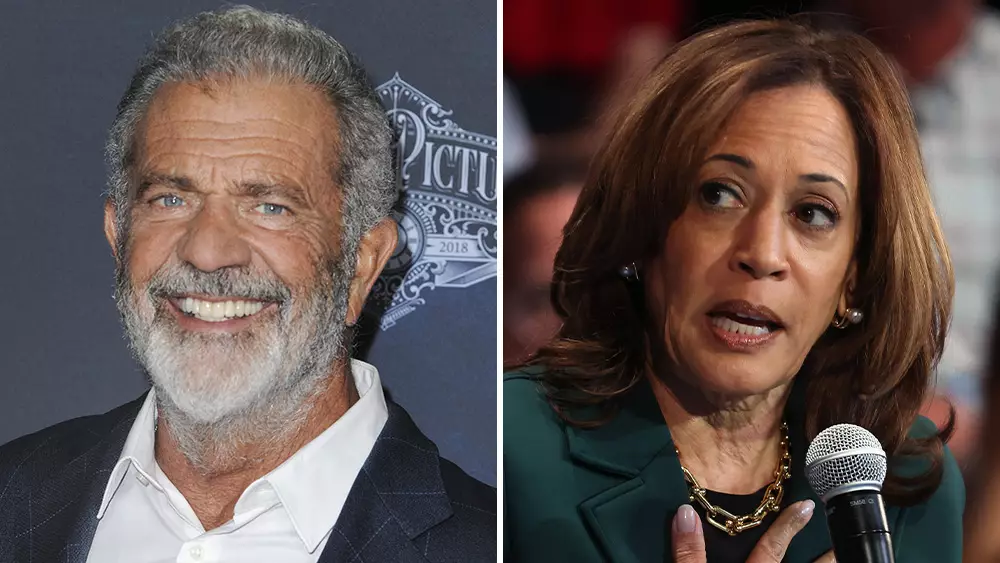In recent discussions surrounding controversial figures in Hollywood, Andrew Garfield’s recent praise of director Mel Gibson for his personal growth sparks an important dialogue about accountability and public persona. Garfield’s words seem like a celebration of Gibson’s redemption, yet Gibson’s recent comments about Vice President Kamala Harris raise complex questions about whether such redemption can truly exist in public discourse.
Garfield’s commendation of Gibson’s “beautiful healing” invites scrutiny. While it’s commendable for public figures to acknowledge others’ journeys towards self-improvement, overlooking past transgressions can be perilous. Particularly in an era where societal tolerance for bigotry and anti-intellectualism is waning, Gibson’s recent inflammatory remarks about Harris—labeling her as having the “IQ of a fence post”—undermine Garfield’s assertion of Gibson’s redemption. The juxtaposition of praise against Gibson’s derogatory comments causes a rift in public perception of morality and accountability in Hollywood.
This scenario is not merely about individual opinions on public figures; it highlights the vulnerability of Hollywood’s moral architecture. Many in the industry grapple with the challenge of separating the art from the artist, especially when past behaviors cast long shadows over present accomplishments. Gibson’s statement echoes sentiments often attributed to his political allies, notably former President Donald Trump, igniting the ongoing debate about the interplay between celebrity influence and political rhetoric.
Gibson’s comments about Harris are reminiscent of similar disparaging remarks made by Trump, who has consistently attacked Harris’s intelligence in various public forums. Such remarks not only reflect individual biases but also contribute to a larger, troubling discourse that seeks to demean political opponents rather than engage with their policies. The choice of language—particularly the analogies of intelligence, such as the comparison to a “fence post”—is problematic. It perpetuates a culture that fosters contempt rather than constructive criticism.
Moreover, this incident poses broader questions about celebrity accountability. Can one truly heal or change if they continue to make hurtful public commentary? Gibson’s legacy is marred by past transgressions, including his notorious rants that carried antisemitic undertones. Even if he has expressed remorse, the recurring nature of his derogatory remarks calls into question the sincerity and depth of his so-called healing process.
Public figures like Gibson wield substantial influence, and their statements can significantly impact societal attitudes and behaviors. Gibson’s harsh critiques of Harris may resonate with certain audiences, thus validating harmful stereotypes about women, particularly women of color in leadership positions. This dynamic is troubling, as it suggests that personal biases can be weaponized through public platforms, potentially influencing voter perceptions and behavior.
Furthermore, the lack of a response from Gibson’s representatives concerning his recent comments amplifies the concerns regarding accountability. In an age where public figures are held to a higher standard due to their influence, silence on problematic statements only fosters a culture of impunity.
In light of these events, the discussion surrounding redemption in the public eye becomes nuanced. While it is crucial to recognize individual growth, it is equally important to hold that growth accountable to the standards of the present. Those who have committed egregious acts should not be allowed to skate by with mere verbal platitudes of change. Instead, ongoing actions and attitudes must match the narrative of redemption being promoted.
Kamala Harris, despite being subject to Gibson’s derogatory remarks, maintains a focused critique of rhetoric from figures like Trump, characterizing them as “increasingly unhinged.” Her positioning as a woman in a high-profile role inherently challenges the derogatory narratives propagated by men like Gibson and Trump, further emphasizing the need for respectful dialogue in the political arena.
As society continues to grapple with figures who provoke both admiration and repulsion, it is essential to foster a discourse rooted in respect, accountability, and genuine progress. The intersection of art, politics, and personal responsibility remains complex, demanding persistent reflection and growth from all public figures, including those often afforded grace because of their past achievements.


Leave a Reply